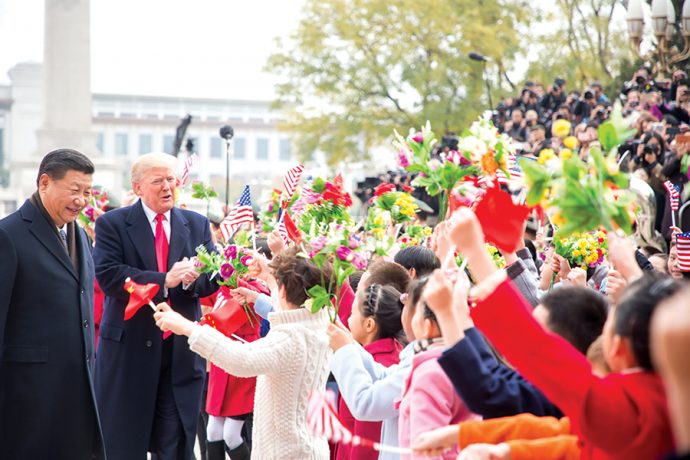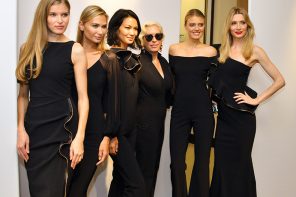When President Donald J. Trump and wife Melania landed in Beijing, China on Nov. 8, they were welcomed by all the pomp and ceremony a state visit plus has to offer.
In other words, they got the emperor’s treatment like no other foreign head of state has had there since the Communists took power in 1949.
To the delight of Trump, the extravagant airport welcome ceremony upstaged the receptions for both Presidents Bill Clinton and Barack Obama and was even more elaborate than Mao Zedong’s welcome to President Richard Nixon in 1972. Trump’s CEO entourage — including the chiefs of influential American companies like Boeing, Westinghouse Electric and Goldman Sachs, all hoping to make deals — were ushered into a caravan of black stretch limousines. En route to Beijing, the heavily escorted convoy was hailed along the road by tens of thousands of citizens and colorfully dressed children who had been organized into a “spontaneous demonstration,” waving Chinese and American flags, instead of the hail of Mao’s “Little Red Book” that had greeted Nixon and Henry Kissinger.
In Tiananmen Square, a smart, red-coated military band was waiting to play the national anthems of both countries while Trump, hand on heart, and Xi stood solemnly side-by-side beneath a gold-trimmed pavilion. Melania Trump, in a long Chinese-style cheongsam intricately embroidered with symbolic white peonies, China’s national flower, contrasted sharply with Xi’s wife, Peng Liyuan, a well-known singer there, in a short, black American style coat as they stood before The Great Hall of People to watch, with the rest of the world, the two most powerful men in the world parade around the red-carpeted square to review China’s Army, Navy and Air Force troops ablaze in full regalia. They later marched past the presidents in a synchronized high-step precision that would’ve been the envy of the Rockettes.
After more pageantry in the Great Hall, the two presidents sat down to flatter each other. Trump spoke of Xi as a friend with whom he had “great chemistry.” He marveled at the hospitality Xi had shown him, including the elaborate military parade about which he said “nothing you can see is so beautiful.”
Xi listened with a rapt smile as Trump said, “I look forward to many years of friendship, working together to solve not only our problems but world problems.” Xi replied: “China and U.S.A. relationship now stands at a new starting point.”
Trump later gushed to Lou Dobbs on the Fox Business Network that “Now some people might call him the king of China….I happen to think he is a very good person.”
Trump’s visit was the first state visit since the 19th Party Congress endorsed Xi’s power last October, making him the unquestioned paramount leader of China and effectively elevating him to a Mao-like status for life. The pomp gave Xi a chance to showcase his “China Dream” — a vision of his nation joining or perhaps supplanting the United States as a superpower leading the world. Xi outlined his plans to make China “a global leader in terms of comprehensive national strength and international influence” by 2050. Like most Chinese leaders, Xi tends to think long-term in contrast to Trump, who seems to have a short-term focus, concentrating on daily news issues.
The grand pageantry in Tiananmen Square was crowned by a lavish banquet for the Trumps held in the dining hall of the ancient emperor’s private palace in the Forbidden City where no one had dared to dine since it was sealed shut after the fall of the Manchu Qing Dynasty in 1912. Then, as a special treat, the rather jet-lagged Trump party attended a traditional Chinese opera plus acrobats held in the Imperial Palace theater once enjoyed by the Ming and Qing royal courts.
Bloomberg Businessweek wondered if the art of the deal worked on Xi, who wants a special relationship that would confirm co-superpower status for China. There was a deal of sorts jointly announced on Nov. 9 by Trump and Xi: $250 billion in commercial sales and two-way investment agreements involving U.S. and Chinese entities. Some of the details will require more negotiation.




